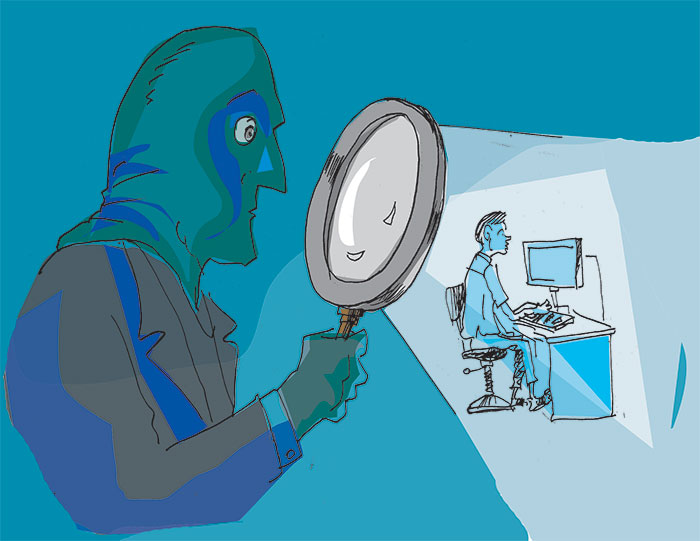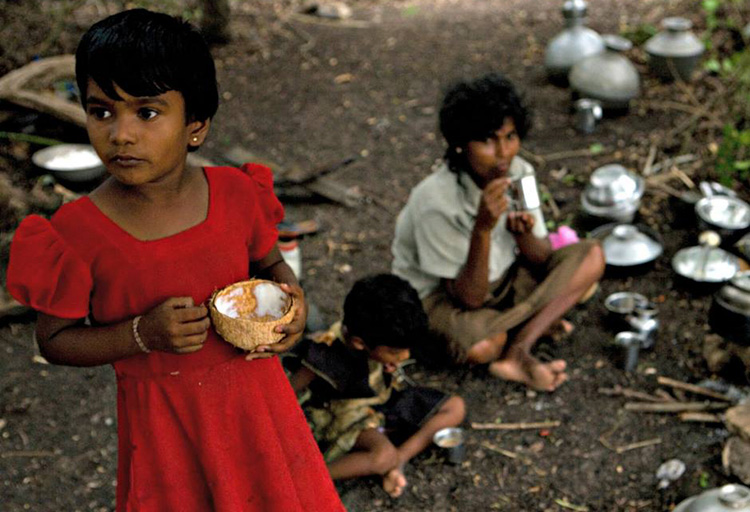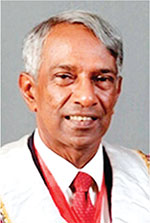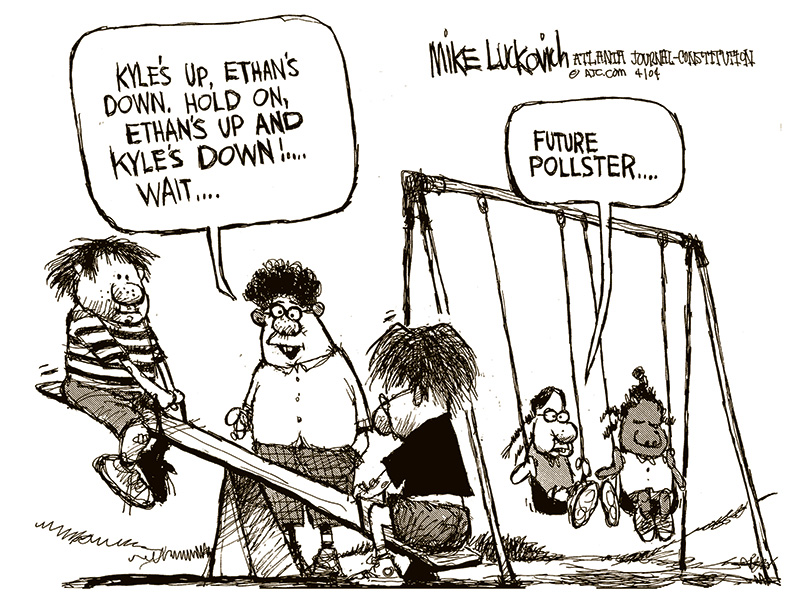Opinion
Will RW go ahead with online security bill?

by SALIYA WEERAKOON
and Prof. ALEX LIN CHEE LOK
In 1914, Cambridge-educated D. R Wijewardena, arguably one of the most recognised entrepreneurs in the country, bought the Sinhala daily Dinamina. History also records that he purchased the English daily, Ceylon Daily News, in 1917. Consequently, Wijewardena is known as the press baron of the pre-independence of Ceylon. He fought for Independence from the colonial masters and was an early mover of the organised press. His son-in-law, Esmond Wickremesinghe, often referred to as one of the best political strategists in the recent history of Sri Lanka, masterminded the editorials of Lake House, the D. R. Wijewardena newspaper group.
Due to one person, even in 2023, the above names are still relevant in the media. He is Ranil Wickremesinghe, the eighth executive president of Sri Lanka. The grandson of DRW and son of EW has a deep understanding of the media business. It is, therefore, an irony that under his presidency, a new online security bill has surfaced. There is an uproar against the bill as, on the face of it, it is Draconian. There is little or no defence for the bill.
No doubt, the bill is lengthy and well-crafted. However, it is less than pragmatic, given how the internet and online world operate. Our view is that it is one-sided. Much more should be factored in if the government earnestly and with good-faith wishes to implement a bill of this nature that affects society so broadly.
Since he entered parliamentary politics in 1977, President Wickremesinghe has held all conceivable positions to have a rounded perspective of the country at large. Since 1994, he has received continuous attacks from politicians, civil society and the media. Even his family newspapers mercilessly attacked him without a pause. A man who withstood all these attacks does not have to be in a hurry to implement such a significant bill, especially when a presidential election is on the horizon. This bill seeks to grant a five-member committee appointed by the President sweeping powers to decide what is wrong and right. In a country known for gossip, lies, manipulation, corruption and nepotism, it is a recipe for disaster to enforce a bill of this nature. Imagine an executive president like President Maithripala Sirisena, whose character, integrity, and intelligence were doubtful to begin with, deciding right from wrong. President Wickremesinghe should know this better than most. If Mahinda Rajapaksa had been given the power to determine what’s right or wrong, many would have been in jail by now!
Will President Wickremesinghe sanction this bill? Or, will he use this opportunity to emerge as the champion of free speech? He is capable of both, as he plays his cards close to the chest all the time.
There are many defences for an online security bill. National security, pornography, blackmailing, character assassination, corporate espionage, media ethics, Ponzi schemes, and the list goes on. Sri Lanka has a history of all of the above. The recent pyramid schemes were promoted and activated online. Thousands of people lost billions in total. Given the country’s problems pertaining to national security, it is essential to keep a tab of the online space. Sri Lanka has earned notoriety for fake news. Sri Lankans love gossip, rumours, half-truths and lies. What most of the Sri Lankans don’t like is hearing the truth.
Forget the online activity, and consider how much mainstream media has propagated lies and fake news. Word of mouth is still the most terrific news tool in the country. There are many cases of fake news that end up in character assassination against not only political leaders but also ordinary citizens. In a country that has seen so much bloodshed, especially over the last 40 years, many have damaged minds. Suicide rate is at an all-time high, and the recent economic downfall has made people extremely vulnerable.
Understanding the digital media landscape in Sri Lanka is difficult. National security is of utmost importance. Providing a safe place for the public is essential. This could have been the underlying factor for this bill unless the government had a sinister plan to switch off public opinion. The country’s Constitution protects the freedom of expression under Chapter 3, section 14. The online security bill can be contested easily in the Supreme Court, and indeed, interested parties will move the courts to stand against this bill.
Online media, in one form, is an outlet to let go of frustration and anger. Why wouldn’t people be frustrated and angry, given how this country has been run since 1948? As one of the oldest democracies, Sri Lanka should allow decent public discourse. The public should have an opinion. The proposed online bill will fail even in a developed country with strict application of laws. However, we are confident that this bill will not be able to be implemented in the present form. If the existing system and regulations have been flawed over the years, we don’t see how this bill can be enforced. There are practical and technical issues of the proposed legislation as well. The global digital platforms cannot understand what is right or wrong. Right or wrong is highly subjective and all based on individual agendas or intelligence levels and life experiences.
Bills of this nature appear everywhere for governments that want to control the conversations. It is inevitable as the media proliferates.
George Orwell in 1949 wrote the book ‘1984’. He was talking about Big Brother watching all, and it was prophetic. It was a science fiction but now a reality. The proposed online security bill goes way beyond Big Brother watching. In a country which lacks transparency and integrity, the system should not try extreme measures of this. The context is essential, and the government should open up public discourse and defend this case if they are accurate to the course.
Politically, such bills are often used to suppress online voices. It advantages the ruling group often but is disguised as protection for the weak (who usually are not online).
If a country has a workable criminal law, and the government understands the technology, then all such “crimes” can be prosecuted under the existing legal framework. There is no need for additional bills or bureaucracies.
Of course, the ability to investigate (i.e., understand the technology and access the data from the Telco) is critical to the policing of the online space.
Since the media is what the population usually trusts, by applying the law to an alleged online falsehood violator, the plaintiff or prosecutor can quickly start a “trial by media,” which can put the person at a credibility disadvantage for whatever he may say later.
Knowing such bills will be violently pushed back in a democracy that enjoys the freedom of speech, one has to be careful about the intention of instigating an uproar. If the government does not communicate clearly and gradually introduce the bill, as people need time and coaxing to understand and accept “what is in it for me”, it will undoubtedly add to the unsettled state of the nation.
Sri Lanka is at a crossroads. The last couple of years have been painful, and people are suffering. With the next presidential election on the horizon in 2024, it will be politically suicidal to anger further a 6 million voter base of people between the ages of 18 and 40. Civil society leaders and a few political leaders have voiced against the proposed bill, and many will join the bandwagon. The public discourse on this will be nasty, unless the government’s objective is to distract the public with the initiative. So why take a risk? What’s the end game?
With the AI revolution upon us, no one can understand the digital world. It’s evolving daily and changing the way we live, work and behave. The deep fake is reality, and the dark web is powerful. Today, without anyone’s knowledge, your pictures are being captured. The surveillance of humans is beyond anyone’s imagination. The un-erasable digital footprints and extreme eyeballing levels are enough to catch any wrongdoers, provided there is a robust legal system and laws. The punishment for wrongdoers should be visible, but importantly, it should be fair. Fairness is not something Sri Lanka is accustomed to.
The government authorities should start by enforcing the existing law. If acted upon with fairness and equality, people will recognise the gravity of fake news. However, fake news cannot be eliminated. It is a losing proposition to assume what people think, grasp, say, and share can be controlled. The only way to combat fake news is to tell the truth. Told correctly, the truth will always win.
President Wickremesinghe has a grand vision for the digital economy. Sri Lanka should move with the world, not against it. The global corporate giants are too big to adhere to local regulations. No one understands where the world is moving, therefore, Sri Lanka should be open to learn from other case studies. No doubt, online security is important, but not in the proposed form.
(Alex is active in the Digital Government, Fintech, Trade Logistics, and Decentralisation industries. In addition, he held exco positions in regional think tanks and working groups with international organizations. He obtained his Electrical & Computer Engineering degree at the University of Wisconsin (Madison) and a Doctorate at Stanford University. Saliya and Alex, together advise governments, corporates and leaders.)
Opinion
Child food poverty: A prowling menace

 by Dr B.J.C.Perera
by Dr B.J.C.Perera
MBBS(Cey), DCH(Cey), DCH(Eng), MD(Paed), MRCP(UK), FRCP(Edin),
FRCP(Lon), FRCPCH(UK), FSLCPaed, FCCP, Hony FRCPCH(UK), Hony. FCGP(SL)
Specialist Consultant Paediatrician and Honorary Senior Fellow,
Postgraduate Institute of Medicine, University of Colombo, Sri Lanka.
Joint Editor, Sri Lanka Journal of Child Health
In an age of unprecedented global development, technological advancements, universal connectivity, and improvements in living standards in many areas of the world, it is a very dark irony that child food poverty remains a pressing issue. UNICEF defines child food poverty as children’s inability to access and consume a nutritious and diverse diet in early childhood. Despite the planet Earth’s undisputed capacity to produce enough food to nourish everyone, millions of children still go hungry each day. We desperately need to explore the multifaceted deleterious effects of child food poverty, on physical health, cognitive development, emotional well-being, and societal impacts and then try to formulate a road map to alleviate its deleterious effects.
Every day, right across the world, millions of parents and families are struggling to provide nutritious and diverse foods that young children desperately need to reach their full potential. Growing inequities, conflict, and climate crises, combined with rising food prices, the overabundance of unhealthy foods, harmful food marketing strategies and poor child-feeding practices, are condemning millions of children to child food poverty.
In a communique dated 06th June 2024, UNICEF reports that globally, 1 in 4 children; approximately 181 million under the age of five, live in severe child food poverty, defined as consuming at most, two of eight food groups in early childhood. These children are up to 50 per cent more likely to suffer from life-threatening malnutrition. Child Food Poverty: Nutrition Deprivation in Early Childhood – the third issue of UNICEF’s flagship Child Nutrition Report – highlights that millions of young children are unable to access and consume the nutritious and diverse diets that are essential for their growth and development in early childhood and beyond.
It is highlighted in the report that four out of five children experiencing severe child food poverty are fed only breastmilk or just some other milk and/or a starchy staple, such as maize, rice or wheat. Less than 10 per cent of these children are fed fruits and vegetables and less than 5 per cent are fed nutrient-dense foods such as eggs, fish, poultry, or meat. These are horrendous statistics that should pull at the heartstrings of the discerning populace of this world.
The report also identifies the drivers of child food poverty. Strikingly, though 46 per cent of all cases of severe child food poverty are among poor households where income poverty is likely to be a major driver, 54 per cent live in relatively wealthier households, among whom poor food environments and feeding practices are the main drivers of food poverty in early childhood.
One of the most immediate and visible effects of child food poverty is its detrimental impact on physical health. Malnutrition, which can result from both insufficient calorie intake and lack of essential nutrients, is a prevalent consequence. Chronic undernourishment during formative years leads to stunted growth, weakened immune systems, and increased susceptibility to infections and diseases. Children who do not receive adequate nutrition are more likely to suffer from conditions such as anaemia, rickets, and developmental delays.
Moreover, the lack of proper nutrition can have long-term health consequences. Malnourished children are at a higher risk of developing chronic illnesses such as heart disease, diabetes, and obesity later in life. The paradox of child food poverty is that it can lead to both undernutrition and overnutrition, with children in food-insecure households often consuming calorie-dense but nutrient-poor foods due to economic constraints. This dietary pattern increases the risk of obesity, creating a vicious cycle of poor health outcomes.
The impacts of child food poverty extend beyond physical health, severely affecting cognitive development and educational attainment. Adequate nutrition is crucial for brain development, particularly in the early years of life. Malnutrition can impair cognitive functions such as attention, memory, and problem-solving skills. Studies have consistently shown that malnourished children perform worse academically compared to their well-nourished peers. Inadequate nutrition during early childhood can lead to reduced school readiness and lower IQ scores. These children often struggle to concentrate in school, miss more days due to illness, and have lower overall academic performance. This educational disadvantage perpetuates the cycle of poverty, as lower educational attainment reduces future employment opportunities and earning potential.
The emotional and psychological effects of child food poverty are profound and are often overlooked. Food insecurity creates a constant state of stress and anxiety for both children and their families. The uncertainty of not knowing when or where the next meal will come from can lead to feelings of helplessness and despair. Children in food-insecure households are more likely to experience behavioural problems, including hyperactivity, aggression, and withdrawal. The stigma associated with poverty and hunger can further exacerbate these emotional challenges. Children who experience food poverty may feel shame and embarrassment, leading to social isolation and reduced self-esteem. This psychological toll can have lasting effects, contributing to mental health issues such as depression and anxiety in adolescence and adulthood.
Child food poverty also perpetuates cycles of poverty and inequality. Children who grow up in food-insecure households are more likely to remain in poverty as adults, continuing the intergenerational transmission of disadvantage. This cycle of poverty exacerbates social disparities, contributing to increased crime rates, reduced social cohesion, and greater reliance on social welfare programmes. The repercussions of child food poverty ripple through society, creating economic and social challenges that affect everyone. The healthcare costs associated with treating malnutrition-related illnesses and chronic diseases are substantial. Additionally, the educational deficits linked to child food poverty result in a less skilled workforce, which hampers economic growth and productivity.
Addressing child food poverty requires a multi-faceted approach that tackles both immediate needs and underlying causes. Policy interventions are crucial in ensuring that all children have access to adequate nutrition. This can include expanding social safety nets, such as food assistance programmes and school meal initiatives, as well as targeted manoeuvres to reach more vulnerable families. Ensuring that these programmes are adequately funded and effectively implemented is essential for their success.
In addition to direct food assistance, broader economic and social policies are needed to address the root causes of poverty. This includes efforts to increase household incomes through living wage policies, job training programs, and economic development initiatives. Supporting families with affordable childcare, healthcare, and housing can also alleviate some of the financial pressures that contribute to food insecurity.
Community-based initiatives play a vital role in combating child food poverty. Local food banks, community gardens, and nutrition education programmes can help provide immediate relief and promote long-term food security. Collaborative efforts between government, non-profits, and the private sector are necessary to create sustainable solutions.
Child food poverty is a profound and inescapable issue with far-reaching consequences. Its deleterious effects on physical health, cognitive development, emotional well-being, and societal stability underscore the urgent need for comprehensive action. As we strive for a more equitable and just world, addressing child food poverty must be a priority. By ensuring that all children have access to adequate nutrition, we can lay the foundation for a healthier, more prosperous future for individuals and society as a whole. The fight against child food poverty is not just a moral imperative but an investment in our collective future. Healthy, well-nourished children are more likely to grow into productive, contributing members of society. The benefits of addressing this issue extend beyond individual well-being, enhancing economic stability and social harmony. It is incumbent upon us all to recognize and act upon the understanding that every child deserves the right to adequate nutrition and the opportunity to thrive.
Despite all of these existent challenges, it is very definitely possible to end child food poverty. The world needs targeted interventions to transform food, health, and social protection systems, and also take steps to strengthen data systems to track progress in reducing child food poverty. All these manoeuvres must comprise a concerted effort towards making nutritious and diverse diets accessible and affordable to all. We need to call for child food poverty reduction to be recognized as a metric of success towards achieving global and national nutrition and development goals.
Material from UNICEF reports and AI assistance are acknowledged.
Opinion
Do opinion polls matter?

By Dr Upul Wijayawardhana
The colossal failure of not a single opinion poll predicting accurately the result of the Indian parliamentary election, the greatest exercise in democracy in the world, raises the question whether the importance of opinion polls is vastly exaggerated. During elections two types of opinion polls are conducted; one based on intentions to vote, published during or before the campaign, often being not very accurate as these are subject to many variables but exit polls, done after the voting where a sample tally of how the voters actually voted, are mostly accurate. However, of the 15 exit polls published soon after all the votes were cast in the massive Indian election, 13 vastly overpredicted the number of seats Modi’s BJP led coalition NDA would obtain, some giving a figure as high as 400, the number Modi claimed he is aiming for. The other two polls grossly underestimated predicting a hung parliament. The actual result is that NDA passed the threshold of 272 comfortably, there being no landslide. BJP by itself was not able to cross the threshold, a significant setback for an overconfident Mody! Whether this would result in less excesses on the part of Modi, like Muslim-bashing, remains to be seen. Anyway, the statement issued by BJP that they would be investigating the reasons for failure rather than blaming the process speaks very highly of the maturity of the democratic process in India.
I was intrigued by this failure of opinion polls as this differs dramatically from opinion polls in the UK. I never failed to watch ‘Election night specials’ on BBC; as the Big Ben strikes ‘ten’ (In the UK polls close at 10pm} the anchor comes out with “Exit polls predict that …” and the actual outcome is often almost as predicted. However, many a time opinion polls conducted during the campaign have got the predictions wrong. There are many explanations for this.
An opinion poll is defined as a research survey of public opinion from a particular sample, the origin of which can be traced back to the 1824 US presidential election, when two local newspapers in North Carolina and Delaware predicted the victory of Andrew Jackson but the sample was local. First national survey was done in 1916 by the magazine, Literary Digest, partly for circulation-raising, by mailing millions of postcards and counting the returns. Of course, this was not very scientific though it accurately predicted the election of Woodrow Wilson.
Since then, opinion polls have grown in extent and complexity with scientific methodology improving the outcome of predictions not only in elections but also in market research. As a result, some of these organisations have become big businesses. For instance, YouGov, an internet-based organisation co-founded by the Iraqi-born British politician Nadim Zahawi, based in London had a revenue of 258 million GBP in 2023.
In Sri Lanka, opinion polls seem to be conducted by only one organisation which, by itself, is a disadvantage, as pooled data from surveys conducted by many are more likely to reflect the true situation. Irrespective of the degree of accuracy, politicians seem to be dependent on the available data which lend explanations to the behaviour of some.
The Institute for Health Policy’s (IHP) Sri Lanka Opinion Tracker Survey has been tracking the voting intentions for the likely candidates for the Presidential election. At one stage the NPP/JVP leader AKD was getting a figure over 50%. This together with some degree of international acceptance made the JVP behave as if they are already in power, leading to some incidents where their true colour was showing.
The comments made by a prominent member of the JVP who claimed that the JVP killed only the riff-raff, raised many questions, in addition to being a total insult to many innocents killed by them including my uncle. Do they have the authority to do so? Do extra-judicial killings continue to be JVP policy? Do they consider anyone who disagrees with them riff-raff? Will they kill them simply because they do not comply like one of my admired teachers, Dr Gladys Jayawardena who was considered riff-raff because she, as the Chairman of the State Pharmaceutical Corporation, arranged to buy drugs cheaper from India? Is it not the height of hypocrisy that AKD is now boasting of his ties to India?
Another big-wig comes with the grand idea of devolving law and order to village level. As stated very strongly, in the editorial “Pledges and reality” (The Island, 20 May) is this what they intend to do: Have JVP kangaroo-courts!
Perhaps, as a result of these incidents AKD’s ratings has dropped to 39%, according to the IHP survey done in April, and Sajith Premadasa’s ratings have increased gradually to match that. Whilst they are level pegging Ranil is far behind at 13%. Is this the reason why Ranil is getting his acolytes to propagate the idea that the best for the country is to extend his tenure by a referendum? He forced the postponement of Local Governments elections by refusing to release funds but he cannot do so for the presidential election for constitutional reasons. He is now looking for loopholes. Has he considered the distinct possibility that the referendum to extend the life of the presidency and the parliament if lost, would double the expenditure?
Unfortunately, this has been an exercise in futility and it would not be surprising if the next survey shows Ranil’s chances dropping even further! Perhaps, the best option available to Ranil is to retire gracefully, taking credit for steadying the economy and saving the country from an anarchic invasion of the parliament, rather than to leave politics in disgrace by coming third in the presidential election. Unless, of course, he is convinced that opinion polls do not matter and what matters is the ballots in the box!
Opinion
Thoughtfulness or mindfulness?

By Prof. Kirthi Tennakone
ktenna@yahoo.co.uk
Thoughtfulness is the quality of being conscious of issues that arise and considering action while seeking explanations. It facilitates finding solutions to problems and judging experiences.
Almost all human accomplishments are consequences of thoughtfulness.
Can you perform day-to-day work efficiently and effectively without being thoughtful? Obviously, no. Are there any major advancements attained without thought and contemplation? Not a single example!
Science and technology, art, music and literary compositions and religion stand conspicuously as products of thought.
Thought could have sinister motives and the only way to eliminate them is through thought itself. Thought could distinguish right from wrong.
Empathy, love, amusement, and expression of sorrow are reflections of thought.
Thought relieves worries by understanding or taking decisive action.
Despite the universal virtue of thoughtfulness, some advocate an idea termed mindfulness, claiming the benefits of nurturing this quality to shape mental wellbeing. The concept is defined as focusing attention to the present moment without judgment. A way of forgetting the worries and calming the mind – a form of meditation. A definition coined in the West to decouple the concept from religion. The attitude could have a temporary advantage as a method of softening negative feelings such as sorrow and anger. However, no man or woman can afford to be non-judgmental all the time. It is incompatible with indispensable thoughtfulness! What is the advantage of diverting attention to one thing without discernment during a few tens of minute’s meditation? The instructors of mindfulness meditation tell you to focus attention on trivial things. Whereas in thoughtfulness, you concentrate the mind on challenging issues. Sometimes arriving at groundbreaking scientific discoveries, solution of mathematical problems or the creation of masterpieces in engineering, art, or literature.
The concept of meditation and mindfulness originated in ancient India around 1000 BCE. Vedic ascetics believed the practice would lead to supernatural powers enabling disclosure of the truth. Failing to meet the said aspiration, notwithstanding so many stories in scripture, is discernable. Otherwise, the world would have been awakened to advancement by ancient Indians before the Greeks. The latter culture emphasized thoughtfulness!
In India, Buddha was the first to deviate from the Vedic philosophy. His teachers, Alara Kalama and Uddaka Ramaputra, were adherents of meditation. Unconvinced of their approach, Buddha concluded a thoughtful analysis of the actualities of life should be the path to realisation. However, in an environment dominated by Vedic tradition, meditation residually persisted when Buddha’s teachings transformed into a religion.
In the early 1970s, a few in the West picked up meditation and mindfulness. We Easterners, who criticize Western ideas all the time, got exalted after seeing something Eastern accepted in the Western circles. Thereafter, Easterners took up the subject more seriously, in the spirit of its definition in the West.
Today, mindfulness has become a marketable commodity – a thriving business spreading worldwide, fueled largely by advertising. There are practice centres, lessons onsite and online, and apps for purchase. Articles written by gurus of the field appear on the web.
What attracts people to mindfulness programmes? Many assume them being stressed and depressed needs to improve their mental capacity. In most instances, these are minor complaints and for understandable reasons, they do not seek mainstream medical interventions but go for exaggeratedly advertised alternatives. Mainstream medical treatments are based on rigorous science and spell out both the pros and cons of the procedure, avoiding overstatement. Whereas the alternative sector makes unsubstantiated claims about the efficacy and effectiveness of the treatment.
Advocates of mindfulness claim the benefits of their prescriptions have been proven scientifically. There are reports (mostly in open-access journals which charge a fee for publication) indicating that authors have found positive aspects of mindfulness or identified reasons correlating the efficacy of such activities. However, they rarely meet standards normally required for unequivocal acceptance. The gold standard of scientific scrutiny is the statistically significant reproducibility of claims.
If a mindfulness guru claims his prescription of meditation cures hypertension, he must record the blood pressure of participants before and after completion of the activity and show the blood pressure of a large percentage has stably dropped and repeat the experiment with different clients. He must also conduct sessions where he adopts another prescription (a placebo) under the same conditions and compares the results. This is not enough, he must request someone else to conduct sessions following his prescription, to rule out the influence of the personality of the instructor.
The laity unaware of the above rigid requirements, accede to purported claims of mindfulness proponents.
A few years ago, an article published and widely cited stated that the practice of mindfulness increases the gray matter density of the brain. A more recent study found there is no such correlation. Popular expositions on the subject do not refer to the latter report. Most mindfulness research published seems to have been conducted intending to prove the benefits of the practice. The hard science demands doing the opposite as well-experiments carried out intending to disprove the claims. You need to be skeptical until things are firmly established.
Despite many efforts diverted to disprove Einstein’s General Theory of Relativity, no contradictions have been found in vain to date, strengthening the validity of the theory. Regarding mindfulness, as it stands, benefits can neither be proved nor disproved, to the gold standard of scientific scrutiny.
Some schools in foreign lands have accommodated mindfulness training programs hoping to develop the mental facility of students and Sri Lanka plans to follow. However, studies also reveal these exercises are ineffective or do more harm than good. Have we investigated this issue before imitation?
Should we force our children to focus attention on one single goal without judgment, even for a moment?
Why not allow young minds to roam wild in their deepest imagination and build castles in the air and encourage them to turn these fantasies into realities by nurturing their thoughtfulness?
Be more thoughtful than mindful?












